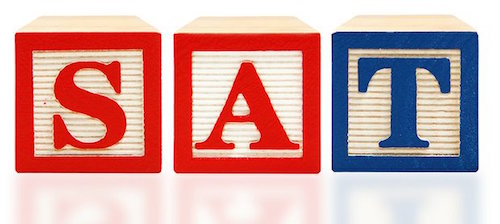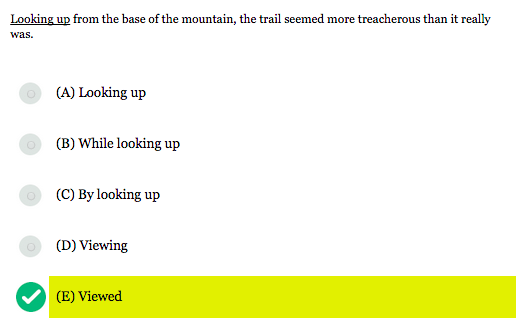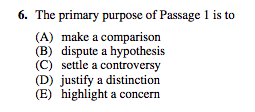In the U.S., the SAT is offered seven times throughout the year, in January, March (or April), May, June, October, November, and December. Internationally, the SAT is typically offered six times, including all the aforementioned dates with the exception of March. The redesigned SAT, commonly referred to as the new SAT, will be first administered in March of 2016. Students testing internationally will first encounter the new SAT in May of 2016.
Rebecca Safier
Recent Posts
SAT Logistics - PrepScholar 2016 Students' Encyclopedia
Overall SAT Structure - PrepScholar 2016 Students' Encyclopedia
The SAT has three sections, Critical Reading (formerly referred to as Verbal), Mathematics, and Writing. All of the questions within these sections are multiple choice, with the exception of a 25 minute essay in Writing and ten student-produced responses in Mathematics.
Function of the SAT - PrepScholar 2016 Students' Encyclopedia
Many 4-year U.S. colleges and universities require SAT or ACT scores from their prospective students. Admissions officers, particularly those selecting for academic ability, consider the SAT as a measurement of academic ability and potential. The SAT is meant to be a reasoning test that evaluates students' problem-solving and analytical skills, rather than their specific content knowledge.
SAT Writing - PrepScholar 2016 Students' Encyclopedia
The Writing section of the SAT consists of multiple choice questions and a 25 minute essay. The Writing section was added to the SAT in 2005, changing the maximum composite score from 1600 to 2400. It was based on, though not directly comparable to, the old SAT Subject Test in Writing.
SAT Critical Reading -PrepScholar 2016 Students' Encyclopedia
The Critical Reading section of the SAT tests students' literacy skills, in particular their reading comprehension and understanding of vocabulary. It is meant to measure students' ability to understand written English on the level needed for success in college courses. Top scorers on this section tend to use methods of speed reading and skimming for important details to their advantage, as Critical Reading questions simultaneously require close reading and efficiency. Studies have also shown that maintaining a mindset of interest in the passages aids a reader's retention of facts and details.
SAT Math - PrepScholar 2016 Students' Encyclopedia
The Mathematics section of the SAT asks students to solve problems with pre-algebra, algebra, geometry, probability, and data analysis from charts and graphs. The SAT does not test advanced math like trigonometry, pre-calculus, or calculus. Students who have taken a high school level algebra class and geometry class likely have sufficient familiarity with the tested concepts to sit for the SAT. Those who have less familiarity with these concepts in their general education will likely benefit from self-teaching with SAT preparation materials.
The SAT is one of two major tests used for admission to 4-year colleges and universities in the United States. Colleges selecting for academic ability often use the SAT, or its counterpart, the ACT, as a critical factor when deciding whether or not to grant admission to prospective students.
If you're a student who wants to leave no stone unturned as you prep for the SAT, then this SAT preparation book guide is for you. These are the best SAT books for students committed to devoting significant time, like 100 or more hours, to get ready for this important test.
The recommendations on this book list go beyond a general review of the SAT and provide the skills, strategies, and insights you need to get a top score. Before diving into the SAT book list, let's consider an important question: are books the most effective way to study for the SAT?
.
College Board's SAT Score Choice policy, started in 2009, means just what it sounds like. Well, you can't choose your scores - "I'll take a 2400, please!" - but you can choose which score reports you send to colleges. If you take the SAT more than once, then you can decide which scores get sent and which ones remain for your eyes only.
Since we're always thinking strategically when it comes to the SAT, this article will discuss not just how Score Choice works, but also how you can use it to your advantage. First, what exactly is SAT Score Choice?
How does SAT Superscoring Affect your Test Strategy?
Lots of colleges "superscore" your SAT scores, or take your highest section scores across all your test dates. Besides making your application stronger, this policy can also be valuable for how you approach the SAT. How does it accomplish all this?
Read on to learn how SAT superscoring affects your overall testing strategy. First, what are the major benefits of SAT superscore?
Imagine you take the SAT in the fall of junior year and get an awesome Reading score. Your math, unfortunately, is not so great. To bring it up, you study for the next few months and retake the SAT in the spring. Your math score shoots way up, but your Reading actually decreases from what you got in the fall. What do you do?!
Luckily, most colleges have a policy of "superscoring" the SAT, or taking your highest section scores across all dates you took the SAT. Let's break down exactly what superscoring is, why schools do it, and what this means for your SAT game plan.
How Homeschooled Students Should Prep for the ACT
Do you receive your education at home or outside the formal setting of a public or private school? If you're a homeschooled student aiming to go to a 4-year college, then you're probably planning to take the ACT (or its equivalent, the SAT).
This guide will go over how you can prep for the ACT as a homeschooled student, come up with a solid test plan, and be strategic in your approach to taking this important test. The first step is asking yourself about your strengths and weaknesses as a student.
Is SAT Word of the Day Really a Good Way to Study Vocab?
How do you learn new words, especially big ones like "obstreperous" and "percipient" that you don't often hear in daily conversation? Do you pore over long lists, make flash cards, or focus on one or two at a time?
For those playing the long game, SAT Word of the Day sites and email lists can be useful resources for gradually building your vocabulary over time. This guide will point you to the best sources of SAT Word of the Day and give you some strategies for how to use them effectively. First, why might you want to study vocabulary this way?
Why SAT/ACT Scores are So Important for Military Students
Are you applying to a military academy like West Point, Naval Academy, or Air Force Academy? While military academy applications are relatively complex (what with having to get nominated by a Congressperson), their requirements for SAT/ACT scores are straightforward. Your challenge is to achieve the SAT/ACT scores you need to stand out among the fierce competition.
This article reviews the SAT/ACT requirements for future cadets and how you can gain the scores you need to attend a training academy in the "Five-Pointed Star." First, let's quickly go over your options.
According to a recent report by the U.S. Department of Education, about 1.7 million students are homeschooled. If you're part of this 3.4% of the population and are planning to apply to a 4-year college, then you'll probably be taking the SAT (or ACT).
This guide will go over the best preparation strategies for succeeding on the SAT, while keeping in mind the unique strengths you bring to the table as a homeschooled student. Before delving into specifics of the SAT, let's consider the advantages that your homeschooled education has afforded you.
























